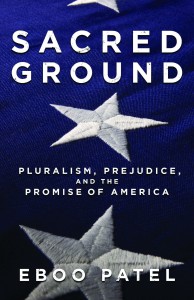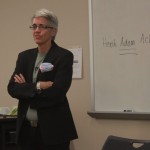 The following is an excerpt from a commentary I wrote for my local newspaper, the Jacksonville Journal-Courier, published last week. The picture to the right is a historic one of our actual intersection of Church and State streets. This commentary brings together the ongoing struggles for marriage equality in the state of Illinois with some reflections on religious pluralism by Eboo Patel, who is speaking on my campus today.
The following is an excerpt from a commentary I wrote for my local newspaper, the Jacksonville Journal-Courier, published last week. The picture to the right is a historic one of our actual intersection of Church and State streets. This commentary brings together the ongoing struggles for marriage equality in the state of Illinois with some reflections on religious pluralism by Eboo Patel, who is speaking on my campus today.
Church intersects with state all over the place in our lives and in American history. To pretend that it doesn’t or to imagine that Thomas Jefferson’s “wall of separation” actually exists is to not comprehend contemporary politics, or U.S. history for that matter.
Consider some of the strongest opposition to a Catholic Kennedy presidency in 1960: Religious.
Consider some of the strongest resistance to the Affordable Care Act’s contraceptive coverage mandate: Religious.
Consider the most vocal opposition to marriage equality for gay and lesbian Americans: Religious.
 In his 2012 book, Sacred Ground: Pluralism, Prejudice and the Promise of America, Eboo Patel argues that the United States is still attempting to live out the dream of pluralism found even among its slave-owning founders. Despite our collective history of violence, conflict and hateful rhetoric that persists today, Patel suggests that the forces of pluralism have defeated the forces of prejudice time and again. He’s both idealistic and pragmatic about this:
In his 2012 book, Sacred Ground: Pluralism, Prejudice and the Promise of America, Eboo Patel argues that the United States is still attempting to live out the dream of pluralism found even among its slave-owning founders. Despite our collective history of violence, conflict and hateful rhetoric that persists today, Patel suggests that the forces of pluralism have defeated the forces of prejudice time and again. He’s both idealistic and pragmatic about this:
“Pluralism is not a birthright in America; it’s a responsibility. Pluralism does not fall from the sky; it does not rise up from the ground. People have fought for pluralism. People have kept the promise.”
We the people have work to do. Right now, the Illinois State Legislature is considering SB-10 “to provide same-sex and different-sex couples and their children equal access to the status, benefits, protections, rights and responsibilities of civil marriage.” The reasons why this law is needed are simple. The advocacy group Illinois Unites for Marriage describes it plainly: “Same-sex couples want to marry for the same reasons all couples do — to protect their families and enter into a lifetime commitment of shared responsibility. All families benefit from the security marriage brings.” If you agree, contact your state legislators now.
When opponents to same-sex marriage make their arguments, they inevitably wind up back at their own religion and their own interpretation of sacred texts. This is when it seems easy to forget that we do not make laws based on sacred texts in this country. We forget that, because church and state intersect everywhere and we’ve stopped realizing when it’s not a good thing.
For this reason, perhaps, the title of this bill, passed by the Illinois State Senate and now under consideration in the Illinois House of Representatives, is “The Religious Freedom and Marriage Fairness Act.” The sponsors even put “religious freedom” in the title before “marriage fairness.” Illinois Unites offers this description of why that matters:
“[The act] protects religious freedom, ensuring that all faiths will decide which marriages can be consecrated within their tradition. The religious exemption language in the bill is very clear: It is and always will be up to each church to decide whom to marry based on their beliefs. No church will ever be forced to recognize a relationship it does not want to.”
I believe all faith traditions should recognize the dignity in loving relationships between two consenting adults and should advocate for their legal protection and recognition. I understand, however, that I’m not allowed to force my beliefs on my neighbor. In the same way, I do not want my neighbor (or my legislator) forcing her beliefs on me.
My faith tradition values, respects and, yes, sanctifies loving, committed relationships, regardless of the gender of the two people involved. My faith tradition also understands that my decisions about contraception and reproductive health care are best made by me, my husband and our health care providers. And my church understands that interreligious dialogue and cooperation are essential tools for creating a better, more just world.
For the full commentary, head over to the Journal-Courier website.












